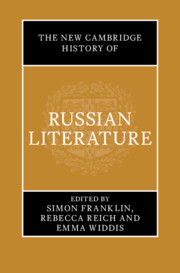Book contents
- The New Cambridge History of Russian Literature
- The New Cambridge History of Russian Literature
- Copyright page
- Contents
- Figures
- Contributors
- Acknowledgements
- On Transliteration, Names, and Dates
- Introduction
- History 1 Movements
- History 2 Mechanisms
- 2.1 The Monastery
- 2.2 The Court
- 2.3 The Salon and the Circle
- 2.4 The Thick Journal
- 2.5 The Publisher
- 2.6 Queerness
- 2.7 The Censor
- 2.8 The Voice
- 2.9 The Self-Publisher
- 2.10 The Market
- 2.11 The Internet
- 2.12 Empire
- Boxes 3 Places
- Boxes 4 Narrative Voices
- History 3 Forms
- History 4 Heroes
- Index
- References
2.11 - The Internet
from History 2 - Mechanisms
Published online by Cambridge University Press: 31 December 2024
- The New Cambridge History of Russian Literature
- The New Cambridge History of Russian Literature
- Copyright page
- Contents
- Figures
- Contributors
- Acknowledgements
- On Transliteration, Names, and Dates
- Introduction
- History 1 Movements
- History 2 Mechanisms
- 2.1 The Monastery
- 2.2 The Court
- 2.3 The Salon and the Circle
- 2.4 The Thick Journal
- 2.5 The Publisher
- 2.6 Queerness
- 2.7 The Censor
- 2.8 The Voice
- 2.9 The Self-Publisher
- 2.10 The Market
- 2.11 The Internet
- 2.12 Empire
- Boxes 3 Places
- Boxes 4 Narrative Voices
- History 3 Forms
- History 4 Heroes
- Index
- References
Summary
Much of Russian literature on the internet remains closely linked to traditional written and printed forms. Russian literature born online resembles that of much of the world, but some genres and forms follow different trajectories due to the peculiarities of the early local Russian online scene. In particular, poetry and code met early and often. Russian-language poets proved early adapters to the World Wide Web. Author-posted web poetry and prose has been anarchic and politically polarised. Early Russian online poetry projects like Vavilon.ru and LitKarta reflected hope for a liberal public sphere. By contrast, much web poetry and prose in the late 2010s and early 2020s has provided a place for celebrating right populism and policing borders – of Russianness, of gender and sexuality, of literary canon, language, and form.
- Type
- Chapter
- Information
- The New Cambridge History of Russian Literature , pp. 407 - 422Publisher: Cambridge University PressPrint publication year: 2024

